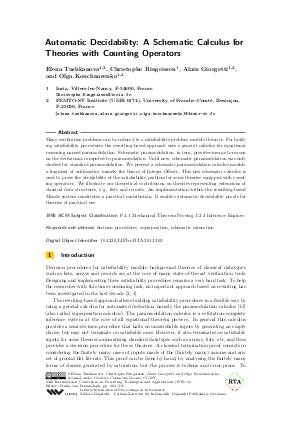Automatic Decidability: A Schematic Calculus for Theories with Counting Operators
Authors Elena Tushkanova, Christophe Ringeissen, Alain Giorgetti, Olga Kouchnarenko
-
Part of:
Volume:
24th International Conference on Rewriting Techniques and Applications (RTA 2013)
Part of: Series: Leibniz International Proceedings in Informatics (LIPIcs)
Part of: Conference: International Conference on Rewriting Techniques and Applications (RTA) - License:
 Creative Commons Attribution 3.0 Unported license
Creative Commons Attribution 3.0 Unported license
- Publication Date: 2013-06-24
File

PDF
LIPIcs.RTA.2013.303.pdf
- Filesize: 0.64 MB
- 16 pages
Document Identifiers
Subject Classification
Keywords
- decision procedures
- superposition
- schematic saturation
Metrics
- Access Statistics
-
Total Accesses (updated on a weekly basis)
0PDF Downloads0Metadata Views
Abstract
Many verification problems can be reduced to a satisfiability problem modulo theories. For building satisfiability procedures the rewriting-based approach uses a general calculus for equational reasoning named paramodulation. Schematic paramodulation, in turn, provides means to reason on the derivations computed by paramodulation. Until now, schematic paramodulation was only studied for standard paramodulation. We present a schematic paramodulation calculus modulo a fragment of arithmetics, namely the theory of Integer Offsets. This new schematic calculus is used to prove the decidability of the satisfiability problem for some theories equipped with counting operators. We illustrate our theoretical contribution on theories representing extensions of classical data structures, e.g., lists and records. An implementation within the rewriting-based Maude system constitutes a practical contribution. It enables automatic decidability proofs for theories of practical use.
Cite As Get BibTex
Elena Tushkanova, Christophe Ringeissen, Alain Giorgetti, and Olga Kouchnarenko. Automatic Decidability: A Schematic Calculus for Theories with Counting Operators. In 24th International Conference on Rewriting Techniques and Applications (RTA 2013). Leibniz International Proceedings in Informatics (LIPIcs), Volume 21, pp. 303-318, Schloss Dagstuhl – Leibniz-Zentrum für Informatik (2013)
https://doi.org/10.4230/LIPIcs.RTA.2013.303
BibTex
@InProceedings{tushkanova_et_al:LIPIcs.RTA.2013.303,
author = {Tushkanova, Elena and Ringeissen, Christophe and Giorgetti, Alain and Kouchnarenko, Olga},
title = {{Automatic Decidability: A Schematic Calculus for Theories with Counting Operators}},
booktitle = {24th International Conference on Rewriting Techniques and Applications (RTA 2013)},
pages = {303--318},
series = {Leibniz International Proceedings in Informatics (LIPIcs)},
ISBN = {978-3-939897-53-8},
ISSN = {1868-8969},
year = {2013},
volume = {21},
editor = {van Raamsdonk, Femke},
publisher = {Schloss Dagstuhl -- Leibniz-Zentrum f{\"u}r Informatik},
address = {Dagstuhl, Germany},
URL = {https://drops.dagstuhl.de/entities/document/10.4230/LIPIcs.RTA.2013.303},
URN = {urn:nbn:de:0030-drops-40696},
doi = {10.4230/LIPIcs.RTA.2013.303},
annote = {Keywords: decision procedures, superposition, schematic saturation}
}
